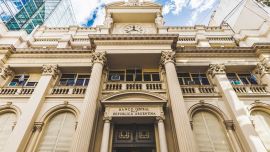Argentina’s ruling coalition is showing signs of strain just 10 months into power, further complicating the nation’s challenge to dig itself out of a deep recession while President Alberto Fernández’s popularity dives.
There are multiple rifts between different factions within the Peronist grouping coming to light, including Fernández’s more centrist bloc and the far-left supporters of powerful Vice-President Cristina Fernández de Kirchner. The timing is especially damaging because his administration is running out of cash and the pandemic is hitting Argentina hard.
A decision last week by the Foreign Ministry to join in a regional vote condemning Venezuela’s Nicolás Maduro for human rights abuses based on a United Nations report was heavily criticised by close allies of Fernández de Kirchner, prompting one diplomat to resign. The incident highlights the ongoing ideological balancing act which extends to economic policy, relations with private business and the courts.
Earlier this year, an attempt to nationalise the distressed Vicentin soybean trading firm, which was applauded by more radical supporters, was reversed after criticism from other allies and the powerful agriculture industry.
While coalition members deny any significant division is taking place, two officials close to Fernández concede the tensions are creating unwanted noise. Peronist leaders say in private that pro-investment reforms are necessary to turn around the economy but the government is unwilling to pay the political cost associated with unpopular policy shifts.
“The president isn’t exercising his power right now and that’s why Peronism is confused,” said Andres Malamud, a political science professor at the University of Lisbon. “It’s a government that isn’t governing, and in Argentina, the economy gets messy without government.”
Peronism, a movement born out of Juan Perón’s first presidency in 1946, typically favours interventionist policies that give workers the upper hand over businesses. But in a sign of its chameleon-like nature, different Peronist governments over the decades have ranged from friends to foes of Wall Street and Washington.
Lot at stake
At stake is whether Argentina can break out of its long-running history of recurrent economic crises and lay the groundwork for sustainable policies that endure beyond any given four-year term. In just the past five years Argentina went from a pariah of the global financial markets to investor darling that hosted a Group of 20 meeting only to again default on its debt and reinstall capital controls.
Lack of policy clarity is adding to an array of problems. After a US$65-billion debt restructuring and initial successes in fighting the coronavirus pandemic, newly issued bonds have tumbled and Argentina’s poor testing and tracing policies have contributed to a worsening of the health crisis. The nation is now fifth among the world’s most-infected countries.
Even nature is testing the government, with uncontrolled wildfires wreaking havoc in the central region of the country.
Between the pre-existing economic issues and the hit from the pandemic, Argentina is spiralling toward its biggest contraction on record this year with mounting speculation that the government will have to devalue the peso.
A person familiar with the president’s thinking said a swift devaluation isn’t politically or economically feasible because of the immediate pass-through to prices and inflation, which would hurt the most vulnerable, including his voter base. At the same time, the pandemic’s unpredictable nature inhibits the government’s ability to think about medium-term policies, the person added.
The internal differences over economic policy have surfaced of late. The decision to tighten currency controls in September revealed a divide between Central Bank chief Miguel Pesce and Economy Minister Martin Guzman. Tensions between them are playing out as the government negotiates how to repay US$44 billion to the International Monetary Fund.
“The economy isn’t going well, the sick are getting worse. It’s a government that hasn’t successfully done anything,” Julio Barbaro, a former Peronist politician, said.
Meanwhile, monthly opposition protests keep growing in downtown Buenos Aires and push back against a proposed judicial reform which some see as a way to protect Fernandez de Kirchner and other officials from lingering legal troubles, has caused more friction.
Fernández has denied any internal fissures or differences with his vice-president.
“If there’s anyone planning a march so that I distance myself from Cristina, they’re mistaken because I’m not going to do it,” he said on October 11.
Open question
Unity inside the country’s biggest political movement was always an open question since Fernández’s electoral win a year ago.
A political operator who had previously never held an elected position, the president rode to victory largely because of Fernández de Kirchner’s deeply loyal voter base from her time as a president from 2007 to 2015.
Eduardo Duhalde, a Peronist who also faced a severe crisis and lasted little more than a year as president through 2003, said Fernández’s administration is paralysed by the country’s growing problems.
“The president is groggy,” he told a local radio station in September.
Polls show Fernández’s approval rating fell to the lowest level since he took office in December, with just 35 percent of Argentines saying the government is doing a good job.
Malamud, the professor, says previous governments were only able to calm chaos by making it clear who called the shots.
“Two things need to change and they’re very unlikely: A strong president and a strong economy minister,” he said. “The only way Alberto can generate confidence is by separating himself from Cristina, and he’s shown he isn’t willing to do it. In fact he seeks to be closer to her.”
related news
by Patrick Gillespie, Bloomberg






















Comments